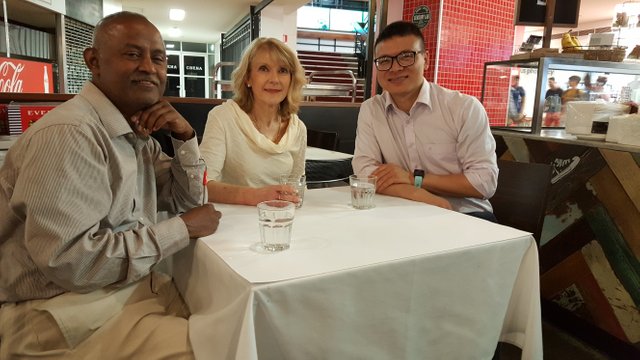[Scholarship] How to win a PhD scholarship? Part 1: Sense of purpose
Running away than facing the fear..
I must admit that I am a quite lucky guy when it comes to scholarships. I won the first scholarship I applied for. It was the 2011 me, a guy with a Bachelor degree ranked Credit, having just two and a half year of work experience, and an English level close to zero. I never thought that that day would come. Having a scholarship, going abroad for the first time, reaching a new skyline, imagine…

However, Ph.D. scholarships were a completely different story. After coming back from Australia in 2014, I continuously searched for a Ph.D. scholarship. But contrary to the first time, I only failed and failed. And failed from the very first rounds. Supervisors refused. Admission application failed. The failures from many attempts let me down. I even thought about quitting my dream.
But my destiny had another idea. Somehow, I met with relevant people who could give me useful advices. One of those was an English teacher, Mr. Vu Ho, who taught me logical thinking and a strategic approach to scholarship application. And this knowledge just illuminated my mind. I knew that I would need to prepare for my Ph.D. scholarship applications with a clear purpose and strategy in mind. I began to work seriously, starting with what I want to do.
You need to wait a bit longer...
Nonetheless, the 2016 scholarship season started off with some great disappointment. I was refused at the first round of the Endeavor Scholarships and Fellowships of the Australian Government, stopped at the third round of the New Zealand Development Scholarship, at the final rounds of Auckland University’s and Western Sydney University’s international postgraduate research scholarships. By mid-November 2016, I did not believe I could win scholarships anymore.
Then came a good news at the most unexpected time. When I tried to get a nap after a hardworking morning session somewhere in Tra Vinh province of Vietnam, my phone tinged. An email came. I won a Ph.D. scholarship from Flinders University in South Australia. The scholarship just made my day and kept lighting up my mood days after. But not just that. Two weeks later, I received another email from Unversity of Canberra granting me another scholarship. Then arrived the offers from Monash University and Latrobe University, wrapping up a 30 day period from mid-November to mid-December on a high note. Four scholarship offers were unbelievable achievements for me. Even right now when I am writing this post, I cannot believe that I did it. But they are true for some reasons. Sharing those reasons with you is the purpose of this series on “How to win a Ph.D. scholarship”.
Sense of purpose is the key
I will show you that even with an average student like me, you can get as far as you want with a right passion, a good strategy and a set of effective tactics.
Everything starts with a sense of purpose.
Have you ever asked yourself what on earth you are living for? What are the reasons for you to come into being in this life? What truly drives you ahead and what makes you most passionate about? Those questions seem a bit too abstract and above all, dull, don’t they?
But, they remind you of one thing: be serious with yourself and with everything you do!!!
If you cannot figure out what your purpose in life is, then how can you start your journey right? Sense of purpose is what you perceive as your ambition, passion, or life mission. It is what you want to do or become or contribute to in future. It is what kicks your ass every time you feel disheartened and want to lie down. To rephrase a famous quote by Kailash Satyarthi:
If not YOU who define your dream, then WHO?; If not do it NOW, then WHEN?
It is a sense of responsibility for your life: you are the ONE that constructs your own LIFE.
Why should you have a strong sense of purpose when applying for scholarship?
Scholarships are just a small step when compared to your life. You do not live for scholarships. You live for your life. Then scholarships must be something contributing to shaping your life. You step on scholarships to reach life goals. Scholarship committees will ask themselves: Is this scholarship really important to realising this student’s goal/mission/passion? Is this student’s life goal or mission or passion worth for us to grant him or her a scholarship? Is he or she unique? You need not just to convince scholarship committees that you are a worthy candidate, but also to make them believe in the significance or social impact of fulfilling your goals. To do so, you must have a strong sense of purpose. If you are not clear about what you are going to do and to contribute, then how can you persuade others?
Below are some of the questions you should ask yourself when it comes to clarifying your sense of purpose:
- What is your life purpose? What motivates you the most? Is doing research the life you want to devote?
- What are your goals in the next 5 or 10 years?
- What are your goals after your Ph.D. completion? What would the Ph.D. scholarship you obtain change your life?
- How can you reach those life goals in short-term, mid-term, and long-term?
Now, be honest with yourself!
After thinking about those questions, do you really want to do Ph.D.? If you want to get rich, Ph.D. might not be as a good option as starting up a business, investing in bitcoin or stock, or occupying a potition in the Vietnamese government system. If you want to get just a Ph.D. degree, buying it costs less. The Ph.D. journey in 3-4 years is truly a big investment in terms of effort, time, health, and even lifespan. This race could lead to draining your eyes, brain, and stomach, giving up your hobbies, limiting your time with family and friends, facing the risk of losing your lover, or even deteriorating your chance of meeting Ms/Mr. Right in the marriage market, to name a few. It costs a lot but has no certain guarantee of the future.
Now, do you still want to do Ph.D.? Is it still worth investing? You don’t want to do it for fun then thinking about doing something else after completion.
To be honest, I never thought about those questions before starting the 2016 scholarship season. Did I want to study Ph.D.? Not really clear. Looking back at that time I was more like a person who tried very hard to run away from an exhausted life: facing traffic jams every fucking morning, getting suffocated by increasing air pollution, fearing unsafe food, getting depressed by ‘marrigage’ questions, and feeling discouraged by prevalent social problems. Getting a scholarship to go aboard was a running away rather than facing the fear of reality. Life seemed vague to me.
But those feelings got me nowhere. Only failures. I did not have any clear ideas for scholarship essays which were full of questions concerning my sense of purpose. People say sometimes a godsend knocks your door; but to make that happen, you need to build a door first.
And I had to be serious at building a house having a door. So, will you?
 Note: Me, on the right, with my two beloved supervisors at a confirmation celebration party (9 months after my commencement at Monash University)
Note: Me, on the right, with my two beloved supervisors at a confirmation celebration party (9 months after my commencement at Monash University)
P.S: This is Part 1 in the series 'How to win a PhD scholarship'. The Part 2 will discuss the components of an application. Note that Part 1's Vietnamese version was published here https://steemit.com/scholarship/@essimay/scholarship-lam-the-nao-de-chinh-phuc-duoc-hoc-bong-tien-si-ky-1-gioi-thieu-va-tinh-muc-dich